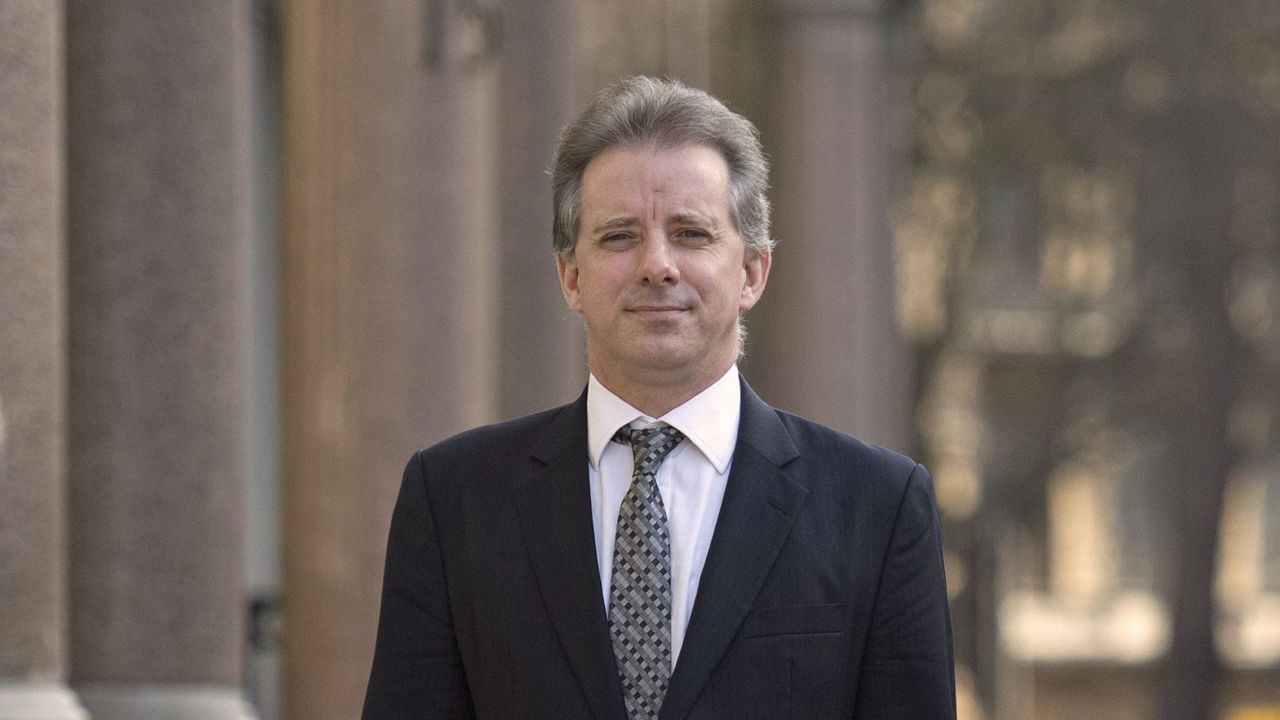Christopher Steele, a former British intelligence official and author of a 2016 dossier that contained salacious information on then-presidential candidate Donald Trump, is defending the contents of the report in his first televised interview since the contents of the dossier were made public in 2017.
In early 2016, Steele was approached by Glenn Simpson, a former reporter for The Wall Street Journal who went on to found Fusion GPS, a Washington, D.C.-based intelligence firm specializing in political and business research. The investigation was funded, in part, by Hillary Clinton’s campaign.
Steele was asked to compile two sets of information, he told ABC News’ George Stephanopolous.
“One was what the Russians were doing in terms of potential interference in the campaign, and two, what the links were between Trump and the Trump campaign and Russia,” Steele said of his investigation.
The legitimacy of what emerged from Steele’s investigation is still subject to debate, and much of the information remains unverified.
"I stand by the work we did, the sources that we had and the professionalism which we applied to it,” Steele maintained.
One item of much debate was the inclusion of Russian-based “kompromat,” or blackmail, on Trump. Steele met with an unnamed individual in a European city who claimed video existed of prostitutes entering a Ritz-Carlton hotel room in Moscow with Trump in 2013, and urinating on the bed in what Stephanopolous referred to as the “pee tape.”
While the tape itself has never been revealed, Steele said he thinks it “probably does (exist), but I wouldn't put 100% certainty on it.”
When asked why Russia has never released said tape, Steele said: "Well, it hasn't needed to be released. I think the Russians felt they'd got pretty good value out of Donald Trump when he was president of the U.S."
Steele also takes issue with the term “Steele Dossier,” the name given to his series of memos written during the 2016 campaign, saying they were more a series of rolling commentary rather than validated information. Still, Steele said four main themes emerged over the course of his investigation.
“One was there was a large-scale Russian interference campaign in the American election in 2016," he told ABC News. "Second was that this had been authorized and ordered at the highest levels, including by Putin. The third being that the objective was to damage Hillary Clinton and to try and get this rather unorthodox candidate, Donald Trump, elected. Fourth was there was evidence of collusion between people around Trump and the Russians.”
Steele sent much of his intelligence to FBI officials in the United States, some of whom ultimately flew to Europe to meet with Steele to discuss the contents of the reports.
Steele’s reports ultimately contributed to Special Counsel Robert Mueller’s investigation into collusion between Trump and Russia, which in 2019 concluded there was no evidence of a criminal conspiracy between the Trump campaign and the Russian government to interfere in the 2016 presidential election.
But the report also described in detail a president driven to interfere in the probe out of fear that it would “call into question the legitimacy of his election” and his own uncertainty that his family or associates may have violated the law.
The early months of the investigation, when agents obtained secret surveillance warrants targeting a former Trump campaign aide, have long been scrutinized by Trump and other critics of the probe who say the FBI made significant errors. An inspector general report last year backed up that criticism but did not find evidence that mistakes in the surveillance applications and other problems with the probe were driven by partisan bias.
Steele said Mueller's overall report reinforced the contents of his dossier.
“There was a wholesale campaign that was organized by the leadership in Russia, that its aim was to get Donald Trump elected,” he said. “And there was a lot of evidence of contacts between the Trump campaign and Russians, which they didn't report on and didn't admit, and in fact lied about.”
Steele also continues to stand by several of the questionable claims in his report, including that then-Trump attorney Michael Cohen secretly traveled to Prague in August 2016 to meet aides of Russian President Vladimir Putin and arrange hush payments for hackers who broke into Democratic Party computers.
Cohen, who in 2018 was sentenced to serve three years in prison for tax evasion and campaign finance violations and was released to home confinement in 2020 due to COVID-19, maintains no such meeting ever occurred. Cohen issued a series of tweets Sunday, one of which said he awaits Steele’s “next secret dossier which proves the existence of Bigfoot, the Lochness Monster and that Elvis is still alive.”
When asked why Cohen would not admit to the alleged meeting despite already being convicted of other crimes, Steele replied: "I think it's so incriminating and demeaning. … And the other reason is he might be scared of the consequences."
Steele went into hiding for a time after Buzzfeed News published a report in 2017 that both Trump and outgoing president Barack Obama had been briefed on evidence of collusion between the Trump campaign and Russia, saying there were “questions of whether my identity might be exposed in the next short period.”
“I was certainly being targeted by the Russians,” Steele said of his time in a safe house in London. “The threat is potentially out there.”
When asked why he decided to publicly speak out on his investigation for the first time, Steele said he was not convinced that the problems he identified have gone away.
"I think the first and most important (reason) is that the problems we identified back in 2016 haven't gone away, and arguably have actually got worse, and I thought it was important to come and set the record straight," he said.
“Out of the Shadows: The Man Behind the Steele Dossier” is available to stream on Hulu.
The Associated Press contributed to this report.



